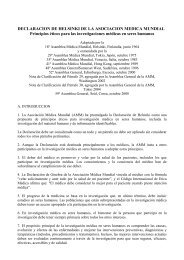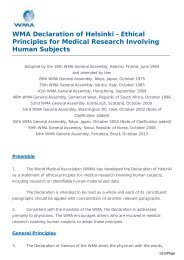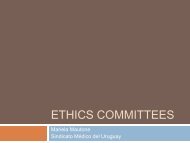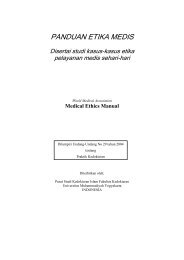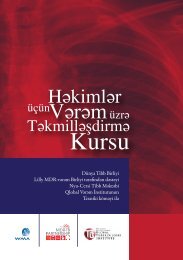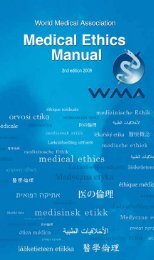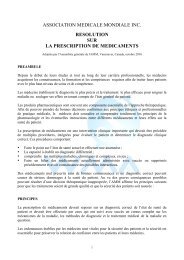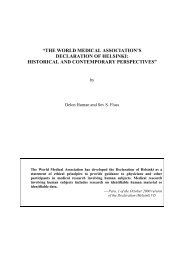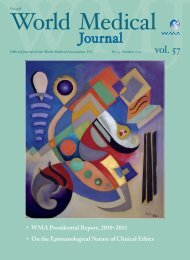WMJ 03 2010 - World Medical Association
WMJ 03 2010 - World Medical Association
WMJ 03 2010 - World Medical Association
- No tags were found...
Create successful ePaper yourself
Turn your PDF publications into a flip-book with our unique Google optimized e-Paper software.
Regional and NMA news<br />
Josif Dzockov<br />
December 2008. The capital is Skopje,<br />
known as a city of solidarity, the name it<br />
got after the disastrous earthquake in 1963,<br />
when many countries around the world<br />
helped to build what was crashed by the<br />
natural disaster.<br />
After the liberation of Macedonia in 1945 it<br />
was not sufficiently built, without significant<br />
industrial facilities and with general poverty.<br />
The country was extremely poor, agrarian,<br />
with a developed trade production. Evident<br />
was the high mortality of the population<br />
that reached up to 21 per mille and mortality<br />
of infants of 154 per mille. Sixty years<br />
later, the overall mortality rate decreased<br />
to 9 per mille, and the mortality rate of infants<br />
to 12.8 per mille (data from 2005). In<br />
1945 there were in total, 123 physicians and<br />
dentists, 92 pharmacists and 120 nurses.<br />
There was no significant health infrastructure.<br />
In addition to several hospitals, others<br />
were mostly small makeshift ambulances<br />
and health clinics. During this period the<br />
country faced major epidemics of malaria<br />
and tuberculosis. This situation changed<br />
over the years in former Yugoslavia and a<br />
significant improvement was the result of<br />
building health facilities supplied with new<br />
equipment and education and training of<br />
the medical personnel abroad (not only in<br />
more developed Yugoslav cities and hospitals,<br />
but in foreign countries as well).<br />
The first <strong>Medical</strong> School (<strong>Medical</strong> Faculty)<br />
was established in November 1947, when the<br />
first generation of doctors began their studies.<br />
The teachers of the first <strong>Medical</strong> School<br />
were not only Macedonians, but were mostly<br />
from Croatia, Serbia, Russia and other<br />
countries. On the other hand, in the period<br />
between the two world wars many Macedonians<br />
studied medicine in several countries<br />
in Europe, mainly in France, in Bordeaux<br />
and Paris, in Switzerland, in Geneva, and in<br />
several universities in Italy.<br />
The state currently has three <strong>Medical</strong> Faculties<br />
that educate medical staff. After the<br />
last complete independence of the country<br />
(1991), the state found itself in a poor situation,<br />
as a result of the need for construction<br />
of the new state infrastructure, economic<br />
blockades, military conflict in the country<br />
in 2001, ongoing privatisation of commercial<br />
enterprises that produced many unemployed<br />
people and so on.<br />
Under such conditions, in 1995 the Parliament<br />
adopted a new Law on health care<br />
that was supposed to follow new trends in<br />
health care in Europe, setting conditions for<br />
a modern health care system. Over the past<br />
fifteen years the law has experienced a total<br />
of 11 changes that harmonised the system<br />
with new experiences and achievements in<br />
the country and abroad. However, the low<br />
gross social product doesn’t allow developing<br />
of the system that will fully meet the<br />
modern experience.<br />
Today in the Republic of Macedonia there<br />
are over 8000 active physicians in all specialties.<br />
Most of them are doctors of general<br />
practice. Their number is around 2500. The<br />
number of unemployed doctors in the country<br />
is around 350, so we are not in a shortage<br />
of doctors, on the contrary. Many of them<br />
are in specialisation training abroad, or they<br />
work abroad, and in the state are registered<br />
as unemployed. There are also trends in<br />
temporary employment abroad. Also, there<br />
are doctors that seek permanent employment<br />
with the departure to other countries.<br />
What concerns, is the high age of doctors<br />
and uneven distribution in the country.<br />
The reform of the health system was started<br />
by the process of privatisation in the health<br />
care. All the doctors in primary care are privatised,<br />
except a small number of them that<br />
take care of immunisation of the population.<br />
Doctors are paid through the so-called<br />
system according to the number and age of<br />
the patients attached.<br />
Similar processes are planned for consultative<br />
and specialist care. The next stage<br />
should be the transformation of hospital<br />
care, planned to function as public private<br />
partnership.<br />
Currently in Macedonia health care providers<br />
are about 8000 doctors, 2500 of whom<br />
are primary care physicians, 2000 are specialists<br />
in specialist consulting health care,<br />
or 2.5 doctors per 1000 inhabitants. The<br />
state has about 9500 hospital beds or one<br />
bed per 219 residents.<br />
At present time there is an ongoing process<br />
of building modern private health care facilities<br />
– modern hospitals, organised with<br />
private venture capital from the country and<br />
abroad. They manage to survive by practising<br />
medicine in areas not requiring lengthy<br />
and costly procedures for treatment. Thus,<br />
they are competitive on the market for<br />
health services and can afford to purchase<br />
modern equipment and high salaries paid<br />
to physicians. That’s why there is an ongoing<br />
process of migration of physicians from<br />
public to private hospitals. In contrast, state<br />
hospitals and university clinics as part of the<br />
public health, are suffering from insufficient<br />
funds with resulting constant problems to<br />
maintain the system. Obvious is the poor<br />
condition of many facilities equipped with<br />
outdated equipment, providing health care<br />
in the public health area.<br />
This is a basic situation that served as a<br />
background for foundation, organisation<br />
and operationalisation of the Macedonian<br />
119



